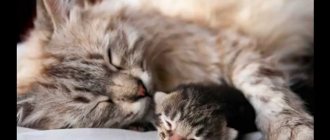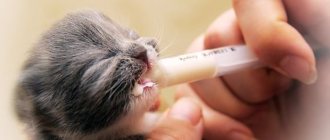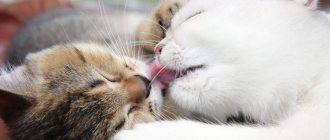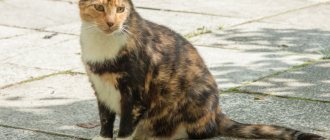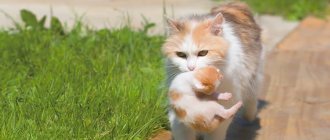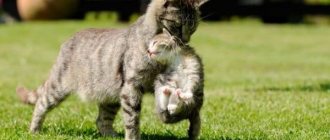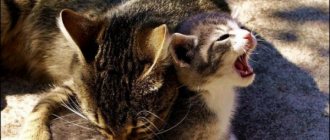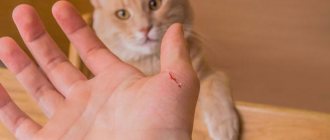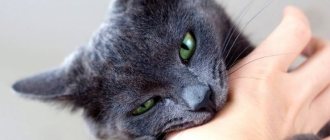Why does a cat eat kittens?
There are not many reasons why cats kill their young.
These include. The main motivating factor may be the lack of sufficient milk. The mother feels responsible for her offspring. When it realizes that it cannot feed everyone, natural selection comes into play. The cat eats weak babies in order to feed stronger ones. Of course, a person can solve the issue of lack of food through his intervention, taking care of some of the cubs, but sometimes the mother manages to get rid of the kittens before the need for additional care arises. In animals, the basic instinct is especially well developed. The main thing is that after separating the kitten from its mother, you should not bring them closer together later. This could end badly. Second on the list, but not least, is man! As one modern poet noted: “Curiosity is a human vice, death is its fruit.” Under no circumstances should you pick up a newborn kitten, stroke it, or carry it. Such reckless actions can cost the cub his life. A foreign smell will remain on it. The cat may refuse it, or feel threatened and kill. Particular attention should be paid to kittens born through cesarean section. This method is unnatural; the female’s maternal instinct may not awaken at all. Genetics dictate that after giving birth the cat must free the cubs from the placenta and eat the dead cubs. But sometimes, being in postpartum shock, the animal may not distinguish a dead kitten from a living one. A cat is a jealous, selfish creature. It happens that, not wanting to share the owner’s love, a pet gets rid of its own offspring, identifying them as a threat
Increased attention should be paid to animals giving birth for the first time. Genetic malfunction in the animal's nervous system. Animal psychologists note that cats are also prone to deviations
It is worth monitoring the pet during pregnancy; if mental disorders associated with a change in condition are observed, the litter should be removed immediately after birth. Also, by gnawing the umbilical cord, the new mother may accidentally injure the kitten, deciding that the baby is too weak, “to put it out of its misery.” Kittens born with physical disabilities will in most cases suffer the same fate. Mastitis. Sometimes, due to the terrible pain caused by this phenomenon, the mother may regard the kittens’ attempts to eat as an attack. In defense, the animal can eat its stronghold.
Recommended reading:
What to do if your cat’s eyes fester - treatment and prevention
cat with kittens
Prevention measures
Experienced breeders, when detecting such inappropriate behavior in a cat, remove it from further breeding, since cannibalism is inherited. The many reasons why a cat strangles her kittens make them difficult to identify. In this regard, the following preventive measures should be followed:
Balanced and nutritious nutrition for a pregnant female with the inclusion of vitamin and mineral supplements in food. A veterinarian will help you get recommendations on creating the optimal diet for pregnancy and after birth. Monitoring the level of calcium in the blood to prevent postpartum eclampsia should be done through clinical analysis, since both high and low levels of the mineral in the body are dangerous;
Preparing the nest in a secluded, quiet and safe place, inaccessible to outside animals. A thick cardboard box or exhibition box is suitable for these purposes. The nest should be placed in a dark place. It should be dry and warm. This organization corresponds as closely as possible to the natural conditions inherent in the cat at the genetic level.
Prevention measures
Experienced breeders, when detecting such inappropriate behavior in a cat, remove it from further breeding, since cannibalism is inherited. The many reasons why a cat strangles her kittens make them difficult to identify. In this regard, the following preventive measures should be followed:
Balanced and nutritious nutrition for a pregnant female with the inclusion of vitamin and mineral supplements in food. A veterinarian will help you get recommendations on creating the optimal diet for pregnancy and after birth. Monitoring the level of calcium in the blood to prevent postpartum eclampsia should be done through clinical analysis, since both high and low levels of the mineral in the body are dangerous;
Preparing the nest in a secluded, quiet and safe place, inaccessible to outside animals. A thick cardboard box or exhibition box is suitable for these purposes. The nest should be placed in a dark place. It should be dry and warm. This organization corresponds as closely as possible to the natural conditions inherent in the cat at the genetic level.
Observation of the birth process of the pet. Unobtrusive help from the owner will calm the mother cat and allow her to control the cat. If aggressive and inappropriate behavior of the mother is detected, newborns should be isolated. The animal, on the recommendation of a veterinarian, may be prescribed sedatives to calm the nervous system.
Availability of food and water after birth. Food resources should not only be freely available to the cat, but also in close proximity to the nest. This will reduce the mother’s nervousness about leaving her babies in the nest, allowing the animal to quickly get enough and eliminate protein deficiency.
Cannibalism in domestic cats is a serious mental disorder based on ancient natural instincts. An animal with a predisposition to eating its own offspring should be excluded from breeding and breeding. Cannibalism has no cure. However, taking preventive measures will allow you to avoid such complex psychological deviations.
Natural cat food
Cannibalism is the eating by organisms (cannibals) of individuals of their own species. It has now been established that more than 1,300 species of animals practice cannibalism in one way or another. These include insects, amphibians, reptiles, birds, mammals and humans. Cannibalism can be considered an example of intraspecific predation, one of the manifestations of intraspecific competition, which is a factor of natural selection. Scientists note that intraspecific predation is most often observed under unfavorable environmental conditions, overcrowding of the population and lack of food and water.
Domestic cats in India, 2011. Photo by Sylvain Cordier, Hemis/Corbis
On the Internet you can find many interesting publications about cat cannibalism, which describe the possible reasons for the occurrence of this phenomenon. For example, common causes include accidentally eating a kitten along with the placenta during birth, eating non-viable offspring, biting off paws or tails due to excessive grooming of kittens, and postpartum eclampsia. Interestingly, there are no scientific studies on the causes of cannibalism in cats. But there are interesting works on cannibalism of birds, pigs, humans and laboratory animals. And here we encounter a noticeable difference about the supposed causes of this phenomenon. For example, a biochemical connection between unbalanced or insufficient nutrition and the occurrence of cannibalism in animals is often traced. For example, a lack of vitamins in the diet of hamsters leads to cannibalism:
“During her life, a female has up to 19 births. At the same time, her body endures great physiological stress, so she must receive milk and additional food rich in vitamins. Their deficiency can lead to cannibalism. Females that eat their young are unsuitable for breeding and breeding work.” — Encyclopedia “Home Zoo Corner”
There were also studies showing the connection of cannibalism directly with serotonin (you can read how to make a cat happy here) and Gamma-aminobutyric acid (GABA). Work showing the connection between cannibalism and low levels of serotonin and GABA was carried out, for example, on a very important issue for animal husbandry - the prevention of cannibalism in chickens. The topic of chicken cannibalism is still very relevant, since pecking leads to economic losses. To prevent cannibalism, a very painful operation is performed on chickens - part of the beak is cut off (de-beaking).
The reasons for pecking are not fully understood; we only know that the risk of cannibalism can be significantly reduced, for example, by introducing table salt into the feed. Recently, scientists were able to trace an inverse correlation between the occurrence of pecking and serotonin levels. The scientific "Journal of Poultry" in 2001 published an article with data from these studies: "The effect of genetic selection on productivity and longevity on the concentration of serotonin in the blood, etc." The work of Heng Chen et al was prompted by the urgency of the problem, since “cannibalism and aggression are major behavioral problems that cause suffering and death in birds and reduce the income of poultry producers.”
In 2008, the authors tried to go the other way and trace the dependence of chicken aggressiveness directly on injections of a serotonin receptor antagonist. The results of the study confirmed what was expected: with injections, aggression and pecking increased in all groups with the only exception - in the group of initially aggressive chickens, the tendency to cannibalism no longer increased. But those chickens that were previously distinguished by their “good disposition” became potential cannibals.
A 1982 study of the aggressive behavior of killer rats led to conclusions that it was provoked by a lack of tryptophan in the diet.
The niacin requirement of many animal species can be met by synthesizing it from tryptophan. The potential vulnerability of felines due to niacin deficiency results from their inability to synthesize this vitamin from tryptophan. Naturally, deficiency of this vitamin is not usually observed, but cats are nevertheless dependent on a dietary source of niacin and it is necessary to ensure that it meets their needs.
In 1992, Ernandes and Giammanco compiled the Aztec diet, and in 1996 they conducted new research. In this work, scientists no longer focus only on the Aztecs and cannibalism, but consider the connection between a lack of serotonin and a tendency towards aggressiveness and religious fanaticism in different countries. Similar data are present in the publications of other scientists. Mandell in 1980 notes a correlation between “mystical feelings” and a lack of serotonin. Rapoport in 1989 notes that one of the obsessive states - obsessive-compulsive disorder, which has similarities with religious fanaticism, is associated with a violation of the transmission of serotonin, etc.
In 2002, three more scientists joined the authors - R. Cedrini, M. Giammanco and A. Milazzo - and a detailed study "Aztec cannibalism and corn consumption: relationship with serotonin deficiency" was born. Russian researchers noticed that cannibal chickens and pigs had a deficiency of another neurotransmitter - gamma-aminobutyric acid. Gamma-aminobutyric acid in the body is formed from another amino acid, glutamic acid, using the enzyme glutamate decarboxylase. When GABA levels are low, there is too much glutamic acid, and vice versa. To increase GABA levels, you need to reduce the amount of glutamic acid. Under normal conditions, excess glutamic acid is automatically converted by the body into GABA. However, sometimes this does not happen. Glutamate decarboxylase (an enzyme that helps convert glutamic acid to GABA) is produced by the pancreas, so problems with it (such as type 1 diabetes) can lead to a lack of GABA. And low levels of vitamin B6 lead to disturbances in the production of glutamate decarboxylase.
Excess calcium in the body disrupts the balance of GABA and glutamic acid. A no-fat or low-protein diet can lead to an imbalance of GABA and glutamic acid. In addition, foods such as sugar, whole grain cereals, starchy foods, chocolate, caffeine, artificial sweeteners and flavors, food additives and colorings can lead to GABA deficiency. Also, vitamin K is important for the balance between the levels of GABA and glutamic acid, as well as taurine, since the amino acid taurine increases the production of glutamate decarboxylase and, after it, GABA. In addition, the cause of GABA deficiency can be the action of environmental toxins: pesticides, herbicides, heavy metals, substances contained in detergents, cosmetics, colognes and perfumes, soaps, air fresheners, which interfere with biochemical processes in the body and disrupt the functioning of neurotransmitters. And what is most interesting is that in the presence of stress, a lack of serotonin, the hormone of joy, in the body, even sufficient amounts of GABA cannot play its role properly. On the one hand, cannibalism in cats is an unstudied phenomenon, however, numerous studies of cannibalism among various animal species, including humans, allow us to draw conclusions about the existence of similar, common causes of cannibalism caused by stress or other deficiencies of the neurotransmitters serotonin and GABA. Despite the fact that cannibalism in cats occurs quite often (in 4-8% of observed cats), to reduce the frequency of manifestations of eating kittens, stress and other causes of deficiency of the neurotransmitters serotonin and GABA should be excluded. If your cat has eaten kittens, you should check and rule out:
- Vitamin B6 (pyridoxine) deficiency
- problems with the pancreas,
- overdose of calcium supplements (preventive treatment of feline eclampsia with calcium supplements can cause the opposite effect due to excess calcium and imbalance of GABA and glutamic acid. Treatment of eclampsia should only be carried out by a veterinarian based on the results of a blood test for ionized calcium
- taurine deficiency (the amino acid taurine increases the production of glutamate decarboxylase and, subsequently, GABA),
- deficiency of other vitamins, such as vitamin K
- animal fat deficiency
- deficiency of niacin and tryptophan.
Also, do not forget that in animals and birds, cannibalism is a natural reaction to an acute shortage of food and overpopulation of the habitat.
Thus, cannibalism in cats is a complex multifactorial phenomenon that should be considered holistically, as a result of chronic or acute stress, unbalanced or insufficient nutrition and as a result of impaired maternal behavior.
Author: Yulia Brovko
Sources:
Feeding cats, Alekseicheva Irina Anatolyevna
We train the brain and memory. Healthy eating, proper breathing, physical exercise, folk recipes, herbal medicine to improve thinking and intelligence Author: I. S. Pigulevskaya
PREVENTION OF CANNIBALISM IN PIGS, A.S. KUZNETSOV, Candidate of Economic Sciences
The gamma-aminobutyric acid system when using adaptogens for the prevention of chicken cannibalism, Ikhlasova, Zuhra Dzhalakhovna
D. Absenthis, Christianity and Ergot
Inheritance of maternal behavior in domestic cats (FELIS CATUS L.) of the Thai breed, Ekaterina Savelyeva TECHNICAL SCIENCE/ “Colloquium-journal”#16(40),2019
Problems of maternal behavior in primiparous females FELIS CATUS L. in different breeds, Ekaterina Savelyeva TECHNICAL SCIENCE/ “Colloquium-journal”#16(40),2019
Reasons why daddy cat destroys offspring
Cannibalism is inherent not only to domestic cats, but also to cats. As a rule, the female hides her nest from outside animals. But often a cat finds it and destroys the offspring. At the same time, males kill not only strangers, but also their own cubs. One of the likely reasons why cats eat kittens is to stimulate the female to come into heat. If a cat that has given birth feeds its offspring, it will go into heat after 3 to 4 months. If the cubs die, estrus occurs almost immediately after the kittens die. This pushes males to destroy their offspring and thereby stimulate the female to go into heat.
Another reason why cats kill kittens is competition, the struggle for existence. Adult males perceive small kittens as future competitors for food resources, territory, and females. That is why they can destroy both other people's cubs and their own. Also for this reason, at the level of natural instincts, the mother cat tries to place the future nest in a secluded place, inaccessible to other animals.
Can a cat eat kittens? Why do cats eat kittens?
As you already understand, the situation when a cat eats kittens is rare. Can adult male cats kill a kitten because it is alien, sick, or for some other reason? And if so, why do cats eat kittens?
Practice shows that cats rarely kill kittens and mostly through negligence (crushed, strangled, etc.). Therefore, you don’t need to worry too much about this if you have a mother with a litter and an adult cat in your house. There is no need to worry especially if the two of them live in the house and there are no other males.
However, some males, like females, inherit cannibalism. Can a cat kill a kitten because it is a cannibal? Definitely yes. Can a cat bite a kitten for this reason? Yes. If a cat ate kittens, does that mean he is a cannibal? Most likely, yes too.
Article continues after advertisement
But the claim that adult cats can kill a kitten simply because they do not like them, consider them future competitors, or are trying to kill kittens from competing cats is largely a myth. However, tragic situations do happen.
It’s a completely different story if someone else’s cat kills a kitten. There may indeed be intent here. But it does not consist in a sense of competition, as happens, for example, with lions. Most likely, if a cat killed kittens from another father, in fact, this has nothing to do with their father, but with their mother. Thus, the cat, having looked for a female for mating, provokes her to start a new heat as soon as possible, when she can be covered. He knows that while she has small children, she most likely will not flow or show interest in him. But if the cat killed the kitten, he has a chance.
Why do cats eat their kittens?
So, we have sorted out the question of whether cats eat their kittens. Yes, this happens. Now let's figure out whether the fact that a cat ate a kitten is a sign of her mental or physical illness.
First birth
For a first-time cat, the process of giving birth and the appearance of kittens is very stressful. Primiparous cats may not leave their nest for days due to confusion and anxiety and may eat their kittens due to extreme hunger or thirst. Therefore, during childbirth, the owner must be present nearby and calm the pet.
Also, when all the kittens are born, the owner should make sure that everyone is attached to the cat, since well-fed kittens are calm. The calmer the kittens are, the calmer the cat feels. If there is a kitten that squeaks a lot and refuses to cling to its mother, it is better to feed it with a syringe with a mixture for kittens and return it to the cat again.
In the case when the cat does not leave its nest, the owner should offer it food (preferably something that the cat really likes, or some kind of wet food) and water, placing bowls in the nest. Food and water should be removed as soon as the cat has eaten. If she refuses food and water, you can offer her something to eat after a short period of time. Food and water should not be left in the nest unattended: when dragging or crawling, the kittens can fall into a bowl of water and choke.
Murder by eating placenta
There are situations when a cat ate a kitten during childbirth, intending to eat only the placenta. After giving birth, the cat is exhausted and feels that there are life-giving substances in the placenta. Therefore, cats often eat the placenta after the birth of their next kitten. But sometimes cats eat their newborn kittens along with it. The thing is that they are not always able to gnaw the umbilical cord without harming the newborn. As a result, he sometimes receives injuries incompatible with life. This is one of the reasons why it is better for the owner to be present during the birth and control everything.
Eclampsia
The most common cause is postpartum eclampsia, a condition of acute calcium deficiency. This leads to excessive irritability of the cat, as a result of which it sometimes eats the kitten, bites off its head, or may hit the kitten against the wall.
Such a cat is physically sick and needs therapy, because... eclampsia ends fatally for the mother herself. But first she may develop neurological symptoms, when everything around her is infuriating, when she is ready to kill everyone, including her offspring.
Whether cats eat newborn kittens due to eclampsia immediately or some time after birth depends on when the pathology fully manifests itself.
When is it normal for a cat to eat kittens?
In some cases, the fact that a cat eats its newborn kittens is a normal instinctive behavior that is dictated by nature, and does not mean that there is something wrong with the animal.
Normal reasons why a cat ate a kitten include the following cases:
:
- stillborn kittens - the inanimate offspring are eaten by the cat along with the afterbirth for a speedy restoration of strength and to prevent damage to the den due to the decomposition of the kittens;
- sick offspring - the cat instinctively immediately knows whether the kittens were born healthy or sick. By nature, the animal has an instinct to raise only strong and healthy kittens, the waste of energy on which is justified in relation to procreation. Even when a domestic cat is well-fed and strong, it will not feed the sick offspring and will eat it immediately after birth or in the immediate hours after it;
- prematurity of kittens - if a cat has a miscarriage, she most often does not abandon the kittens, but eats them along with the afterbirth. She herself receives many nutrients from this that help her recover from a miscarriage;
- a very numerous litter - if more kittens are born than the cat can feed, she will keep only the strongest and strongest, and eat the weak ones without waiting for them to die. A cat can give birth to too many kittens every time;
- exhaustion of the body - if a cat brought a second offspring very quickly after the first, then, in order to save her life, she will kill the second litter, since her body is too weakened and she is not able to feed newborn kittens a second time. A female can normally give birth and raise kittens only once a year;
- lack of food (the pet does not suffer from this if it is fed correctly) - if a cat is starving, it cannot raise kittens and eats them to preserve its own life. In the future, she will be able to continue the family line.
In all these cases, the phenomenon of cannibalism, although unpleasant, is natural and should not frighten the owner. It is not fixed and is not preserved in instinct in a cat, so in the future it will not spread in a strong female to healthy offspring under favorable living conditions. If there is an adult cat in the house, then it can kill the kittens, not the cat. In such a situation, cats eat their kittens after finding them dead.
Daddy cats
Fathers sometimes behave even more strangely than mothers. Experts are trying to understand what the problem is.
Fighting for the cat's attention. Cats understand that after giving birth a “woman” will be completely captivated by her offspring, so they try in every possible way to get rid of their rivals
After the death of the babies, the mother quickly resumes estrus and is again ready to mate. All the best for your children. This is clearly demonstrated by cats in nurseries, eating other people's cubs and making room in the sun for their own. The struggle for leadership. Just as cats determine the viability of kittens, cats clearly distinguish babies of their own sex. Destroy the leader, the leader - this is the goal of the dad cat. This is especially evident in the case of pets.
Cannibalism is characteristic not only of cats, but also of many other animals. Some of them regulate the population in this way, others demonstrate an example of natural selection. It looks wild with pets, so you can only prevent your pet’s inappropriate behavior by taking care of her before and during childbirth.
- How many kittens does a cat give birth to for the first time?
- Bleeding in a pregnant cat: what to do
- How does a cat behave after mating?
Causes of cannibalism in cats
Cannibalism is intraspecific predation when animals of the same species are able to eat each other. This phenomenon is widespread among fish, insects, and is often found in mammals. Moreover, females are more predisposed to cannibalism than males. The reasons in nature are related to hunger or its threat, a change in habitat. In the wild, eating her offspring is due to an adaptive type of behavior, when, in order to preserve all offspring, the mother eats sick and weak cubs. In domestic animals, the phenomenon of cannibalism is less common. Nevertheless, cases of eating their offspring are often observed in pigs, dogs, and cats.
Numerous causes of cannibalism in domestic cats indicate a complex mechanism of this phenomenon.
Reasons for eating offspring
Cannibalism is the eating of one animal of a given species by another. Distributed mainly among fish, insects, and sometimes found in warm-blooded animals. Females are more aggressive than males. And the reasons are often due to a change in habitat, preservation of offspring, and hunger. It occurs much less frequently in domestic animals.
However, you should not breed pets more than once a year. After giving birth, it takes time to recover, otherwise the cat may eat the stronghold, as it will be exhausted and will not be able to produce healthy offspring.
Cat eats kittens
Prevention measures
Experienced breeders, when detecting such inappropriate behavior in a cat, remove it from further breeding, since cannibalism is inherited. The many reasons why a cat strangles her kittens make them difficult to identify. In this regard, the following preventive measures should be followed:
Balanced and nutritious nutrition for a pregnant female with the inclusion of vitamin and mineral supplements in food. A veterinarian will help you get recommendations on creating the optimal diet for pregnancy and after birth. Monitoring the level of calcium in the blood to prevent postpartum eclampsia should be done through clinical analysis, since both high and low levels of the mineral in the body are dangerous;
Preparing the nest in a secluded, quiet and safe place, inaccessible to outside animals. A thick cardboard box or exhibition box is suitable for these purposes. The nest should be placed in a dark place. It should be dry and warm. This organization corresponds as closely as possible to the natural conditions inherent in the cat at the genetic level.
Causes
Many people know about such an evolutionary factor as natural selection from the school biology curriculum. Most often, this is the reason that cats kill their kittens. There are also a number of other factors that push an animal to kill.
Maternal instinct
Many people are familiar with the situation when, after the birth of kittens, their mother becomes aggressive and protects the offspring in every possible way. Animals have a very strongly developed maternal instinct. In nature, for example, a cat hides its offspring from prying eyes for a long time and takes care of them until the cubs become independent. It turns out that maternal instinct is not only a benefit for babies, but sometimes also a cause of death.
During pregnancy, no one screens animals for genetic abnormalities, so only after the kittens appear can one judge the health of the offspring. Animals are their own diagnosticians. The mother immediately sees which of her cubs was born sick, so she tries to get rid of him as quickly as possible. In nature, a cat simply leaves the baby, but at home it eats its newborn kittens. Why can’t you just give them up and not feed them? The answer to this question will again be the fact of a highly developed sense of responsibility for the offspring. For a mother, abandoning a baby is a lot of stress, so the animal struggles with this situation radically.
Sometimes owners say that a week passed after the birth, everything was fine, the mother took care of the kittens, and one day some of the babies were missing or found dead. One of the reasons for inappropriate behavior is a lack of milk. In this case, the cat itself decides which of the kittens to keep and which to kill, because she cannot waste milk, so valuable for healthy babies, on their weak and sick brother. Scientists still cannot understand how a cat determines the level of vitality of its babies.
When a person is nearby
No matter how much the owner cares about his pet and her children, a human will always be the odd one out in a cat family. Some animals are very jealous of people touching their newborn babies. Someone else's smell can completely kill the maternal instinct. The animal may perceive a kitten that has been in the hands of a person as a stranger and try to get rid of it. This also explains why cats eat their kittens born by Caesarean section. Instincts play a big role here: no natural childbirth means no launch of a program to activate maternal feelings. For the same reason, cats often refuse to feed other people's offspring, although dogs do this without problems.
Firstborn cats
Studies have shown that it is mother cats who give birth for the first time who are the most aggressive towards their offspring. It's all about changing hormonal levels, as a result of which the feeling of selfishness takes precedence over the maternal instinct. And this happens most often with pets. The love of the owner is the goal of life for an animal, so you don’t want to share it with someone else, even if that someone is your own child. To prevent the situation, the owner must monitor his pet during childbirth: if after the birth of the first kitten the cat licked it, then everything will be fine with the rest, but if it growls and rushes, then it is better to take the baby away from such a would-be mother.
Rock of fate
After giving birth, animals always eat the afterbirth and dead babies. Sometimes, due to a state of shock, the animal has a malfunction, and the new mother confuses the dead kitten with a living one or gets carried away with eating the placenta and eats the baby along with it. To prevent this from happening, the owner must be nearby. There are cases when a cat injures its children while gnawing the umbilical cord.
Is it possible to eat cats?
Animal rights activists around the world have pushed for a reduction in the number of restaurants that serve cats and dogs. Similar establishments remain, but they are not advertised as before, even in Peru. And in Italy, human rights activists achieved the dismissal of a famous TV presenter because he stated on air that he had tried cat meat and dictated the recipe. In Russia, the law on cruelty to animals has not yet been finalized, so it is unlikely that anyone will punish cat eaters. Of course, there is no such exotic product in the official trade, so whether to eat cats or not is, as they say, a matter of taste and moral principles of everyone.
Cats have a very well developed maternal instinct; it tightly bonds the baby and the mother. Thus, she completely surrenders to the child, showing maximum tenderness and love. But sometimes something makes us think about whether cats eat their kittens, or whether this is another unjustified legend. And to our horror, once again harsh reality wins.
Why do cats eat kittens?
It is rare, but it happens that cats eat their kittens, this happens immediately after the babies are born. In this case, maternal instinct and the smell of colostrum remained far in the shadow of cannibalism.
The reasons for devouring a baby are not as terrible as the fact of what is happening. Cats usually eat the placenta and kittens that are stillborn. Sometimes they can harm the baby when they gnaw the umbilical cord, or accidentally destroy it along with the placenta. But the mother can do this quite consciously. There are several reasons why cats eat their kittens. If a baby is born weak or with physical disabilities, then it is quite possible that he is doomed to die. Thus, the mother brings into life only strong and hardy offspring.
Another reason why a cat eats her kittens is that the animal’s maternal instinct may not be sufficiently expressed, and the baby, again, is thrown to the mercy of fate. Nature makes its life selection with particular cruelty.
Why do cats eat kittens?
The birth of babies usually takes place in a safe, warm and cozy place that the mother herself considers suitable for her babies. But there are such unfortunate cases when cats reveal where the kittens are and brutally kill them. They eat not only their own, but also other people's cubs.
For thousands of years there has been a theory that animals do this
to bring the cat back to being ready to mate. Having given birth to babies, the mother loses all interest in the opposite sex, giving the child all her care and love, and the loss of the cubs provokes a new estrus.
Some experts believe that cats eat other people's kittens to make room for their offspring. And if they kill male cubs, it means they want to get rid of competitors in the future who will be able to lay claim to females and territory.
The animal world is quite cruel and sometimes has nothing to do with morality. But we must understand that their behavior probably has a reasonable explanation, because reflexes and a stereotype of actions have been formed over many millennia.
Reasons for the destruction of offspring
Cat cannibalism is a common phenomenon, which is the process of an animal eating its own relative.
There are several factors for a cat destroying its own offspring. The main reasons are the following:
- Lack of milk. The cat eats the weakest kittens to feed the stronger ones.
- Human curiosity. Under no circumstances is it recommended to hold newborn babies. This reckless action could cost the kitten its life. The cat, sensing someone else's smell, refuses it or eats it.
- Postpartum shock. The cat is genetically programmed to free the born kitten from the placenta and destroy stillborn cubs. But a cat that has lambed for the first time, being in postpartum shock, often cannot distinguish a dead baby from a living one and eats the entire litter.
- Jealousy. Cats are jealous creatures. Some individuals, not wanting to share their master's love, get rid of their offspring, and they may not do this immediately, but after one or even three to four weeks after the birth of the kittens. Therefore, in the first month of life, it is not recommended to pick them up, and you should also pay more attention to the pet.
- Genetic failure. Animal psychologists believe that a cat that has given birth is prone to mental disorders. Therefore, if the breeder notices a change in the condition of a pregnant pet, the litter is taken away immediately after lambing.
- Physical deviation. The mother cat “relieves defective and too weak kittens from suffering” by eating them.
- Mastitis. The disease is accompanied by severe pain. The young mother regards the kittens' attempts to eat as an attack and therefore deals with the entire litter at once.
Pathological causes
Mental disorders
Psycho-emotional disorders experienced during childbirth can cause a cat to eat kittens. Such inappropriate behavior can be provoked by unsatisfactory conditions for childbirth: an unprepared “nest”, its inadequacy for raising young, the presence of strangers and animals.
Hormonal abnormalities
Due to hormonal imbalances, the cat’s maternal instinct may not be formed, and then the cat perceives the cubs as strangers and can eat them.
The issue is especially acute when the cat does not give birth naturally, but has to undergo a caesarean section. Since instincts may not be triggered, the cat perceives the cubs as strangers.
Therefore, if you notice aggression from the mother towards the offspring, immediately separate the cubs from her. Of course, you will have to look for another mother, and the babies will have little chance of survival, but cannibalism can be prevented.
Treatment
Why does a cat eat her kittens and does it need treatment?
Unfortunately, cannibalism is not a physical disease at all, so drug treatment is inappropriate. Eating one's own offspring is caused by stress or a failure in the instinctual system. The deviation most often appears during the first birth, and subsequently may never make itself felt again.
If a cat has a persistent tendency towards aggression towards its offspring, it is worth blocking the possibility of reproduction. Since there is a high probability of manifestation of this disorder in subsequent generations.
However, this reaction of the animal can be caused by hormonal imbalance. In this case, prophylaxis is prescribed. Progestins are used to correct disorders.
Recommended reading:
Heat in cats: what is it, symptoms and how to help your cat
cat and kitten
Why do cats kill kittens?
The origins of such a cruel attitude towards furry babies by human standards can be seen by studying the habits of wild cats in their natural environment. For example, in lions, all females become pregnant exclusively from the “king of the pride,” and when, in the process of intraspecific struggle for territory, power goes to another male, he invariably kills all the suckling young left by the previous leader. This helps to stop lactation in lionesses and stimulates the beginning of a new sexual cycle, during which mating occurs with a new “king”. Thus, the offspring of the strongest male survives, which ensures the evolutionary viability of the species as a whole.
Domestic cats are guided by the same thing, despite their long-standing tameness, proximity to human habitation and abundance of food. But why do cats kill kittens from a rival male? How do they distinguish between their own and other people's cubs?
It turns out that animal senses are capable of establishing the fact of paternity no worse than a modern DNA test. And the whole point is that the mother cat constantly rubs her muzzle against the bodies of her kittens, spreading an individual scent mark on them. Murks have special scent glands in the corners of their eyes, on their chins and behind their ears. By rubbing themselves against certain objects and the human owner, cats mark them, denoting private territorial possessions. By sniffing the “messages” left behind, the tailed relatives recognize the socio-physiological status of the individual, instantly identifying the stranger.
Accordingly, the smell of the facial glands left by the mother cat on the kittens becomes a signal “yours!” for male cats who mated with her. Many cats, having recognized children, remain indifferent to them, but some become caring fathers, protecting their family from enemies and regularly bringing food.
In addition, wise nature countered the predatory instinct of murder with an equally powerful maternal instinct. Considering the large number of cats in the private sector, pregnant females try to make their lair in the most secluded place and carefully hide newborn kittens. They try to keep the nest clean, and when caring for the babies, they carefully lick them, neutralizing all odors. Nursing mothers minimize their time outside the den, rushing as fast as they can to their babies and, on occasion, staunchly protecting their offspring.
Preventive measures
Cannibalism is not considered a physical disease. Therefore, treatment with medications will not give results. If the owner notices that a pregnant cat has an unstable mental state, manifested by excessive activity, fussiness or irritability, he is recommended to increase monitoring of the animal.
It is important to pay more attention to her and show her love more often. A few weeks before the start of lambing, she is provided with a secluded place where she and her brood will feel calm
This could be a special cat house, a box or a wooden box with soft bedding, an entrance hole and a window for observing the birth in order to provide timely assistance if needed.
When kittens are born, it is important to provide the pet with maximum peace and not to be excessively intrusive. But you can’t completely ignore it either.
Other pets should be removed from the room during the birth. The owner must be on alert in order to save the kitten's life in time.
What should owners do?
What to do if a cat carries kittens? This is the question that puzzles owners as they watch their pet looking for a new place for her offspring and transferring the cubs there.
First of all, it is necessary to understand the reasons that prompt the animal to such actions. Kittens should not be selected or placed in a place chosen by the owner. It is necessary to trace where the cat has found a new place and help build her a nest.
The animal should be denied access to places where the arrangement of a new place would be unsafe (balcony, space under the bathroom, etc.). Under no circumstances should you scold or punish a caring mother.
The animal obeys natural instincts and takes care of its offspring as nature dictates.
Owners sometimes misinterpret why a cat brings kittens to bed. You should not think that a caring mother entrusts her offspring to household members or brags about her kittens. Such feelings are alien to animals. The reason for the behavior is the search for a more favorable place for their offspring. And the master’s bed can be chosen as this place (warm, dry, clean).
There is also nothing touching about an animal dragging its cubs to a person. The reason why a cat brings kittens to the owner is, as a rule, a lack of food. The pet perceives humans as a source of food resources. As babies grow older, milk is no longer enough and they need solid food. This is why a cat brings its cubs to humans as a source of food.
Pathological causes
The natural behavior of an animal is based on its instincts. Even millennia of domestication did little to change them. But in some cases, the cause of cannibalism lies in the illness of the mother.
Pregnancy can cause hormonal and mental disorders
To understand why the cat ate the kitten, you need to study its condition.
Hormonal problems
Due to various failures, the formation of the maternal instinct may be disrupted in the female. This happens especially often due to caesarean section. In this case, the production of oxytocin is delayed, and the cat perceives live kittens as strangers.
For your information! Sometimes everything is limited to aggression or ignoring the kids.
Maternal instinct may wake up after a while, but it’s better not to risk it. Childbirth takes a lot of energy from a cat, and she can eat her offspring. Therefore, in case of aggression on her part, the babies must be removed and fed independently.
Psychical deviations
Another reason why animals exhibit cannibalism is mental disorder. Such problems arise not only among people. They can be provoked by difficult childbirth, lack of a “nest,” the presence of people and other factors.
Sometimes mental problems develop due to congenital pathologies. If the animal is aggressive, often bites and scratches, and hisses, then it is not advisable to breed an evil cat. It is more likely that her behavior will affect her offspring.
Sometimes a cat may not eat the kittens right away. Nervous females may do this after humans carry and handle the cubs. In this case, she will perceive the kids as strangers.
Mental disorders may become visible after childbirth. In this case, the cat immediately shows aggression towards the offspring and leaves them.
Cat behavior
Males can also destroy cubs, and this happens not only with other people's babies. It is not obvious to all owners why cats eat kittens. The main goal of males is to fertilize as many females as possible. Therefore, they can stimulate the onset of estrus by killing the kittens.
In this case, the cat takes the cub, strangles it, but does not eat it. He won't be able to swallow it or tear it apart. Therefore, cats subconsciously strive to find a secluded and inaccessible place.
Important! During pregnancy, it is better to remove the cat for a while. Preferably before all kittens are weaned
Cats can also have mental problems. Then they perceive all the kids as strangers and try to kill them. Pet owners need to carefully monitor their pets' behavior.
Scientific fact: Domestic cats easily become cannibals
A nightmare, and that's all. Although the deceased no longer cares.
“I’m going to die, and the cats will eat me up” - there is such fear, believe me. And it is very widespread. Especially among older and lonely people. Prejudice? Not at all. Research recently conducted by American biologists has clearly demonstrated that these nightmarish fears are by no means groundless.
Scientists did not plan to study the characteristics of cat nutrition. By chance, the experiments organized themselves on the territory of the so-called “body farm” - a testing ground created at Colorado Mesa University's Forensic Investigation Research Station to study the processes of decomposition of corpses. Corpses - unclaimed or, on the contrary, bequeathed by the owners, are laid out here and there, observing what happens to them after this or that time. There are about a dozen such “farms” around the world. The results of their research are used by criminologists and forensic experts.
First, one cat snuck into the “Colorado farm”—“tabby,” as it was called. She made her way and began to gnaw the body of a 70-year-old man, laid out at the landfill 5 days ago. Scientists became interested and began to monitor the cat using surveillance cameras, recording the characteristics of its behavior.
Then a black cat wandered in. And he began to eat the corpse of a 79-year-old woman. He came at night.
The landfill staff covered the corpses with nets so that the cats could not get to them. And they were very surprised that the cannibals did not switch to other bodies from among the approximately 40 laid out at the site, access to which was not limited.
A few days later, the covered corpses were discovered again. The cats were even more surprising: they returned to the bodies they had gnawed before, showing some kind of terrible affection.
As a result, the animals ate dead flesh for about six weeks. Each cat made at least 12 visits. They collected tissue from the bodies of the arms, legs, chest, and abdomen. Scavengers - one word. But cats, especially stray ones, are predators. They easily get food in the form of mice and birds.
Illustration from a scientific publication: a black cat eats the hand of a dead old woman.
It is possible that the “tabby cat” and the black cat, who strayed to the “farm”, had a perverted taste.
— Cats are very picky eaters. If they find something attractive, they will definitely return to that food. These words of Sara Garcia, who led the research, are quoted by The Washington Post, talking about the nauseating experiments. The scientists themselves first reported their results at the annual meeting of the American Academy of Forensic Sciences (71st Annual Scientific Meeting of the American Academy of Forensic Sciences), and then published them in the specialized journal Journal of Forensic Sciences.
It is believed that cats begin to eat corpses when they become very hungry. But there is also a not so banal hypothesis. Allegedly, in cases where the owner or mistress dies, the cat may begin to gnaw at them in order to attract attention. Or trying to bring them back to life. This is the opinion of Mikel Delgado, a feline behavior specialist at the University of California at Davis School of Veterinary Medicine.
By the way, cats are no strangers to cannibalism. Having eaten the owner, they can begin to eat each other. This, for example, happened two years ago in the village of Amursky, Omsk Region. Of the 40 orphaned cats, only one survived. The rest were killed by their brothers locked in the room.
Pathological causes
Mental disorders
Psycho-emotional disorders experienced during childbirth can cause a cat to eat kittens. Such inappropriate behavior can be provoked by unsatisfactory conditions for childbirth: an unprepared “nest”, its inadequacy for raising young, the presence of strangers and animals.
Hormonal abnormalities
Due to hormonal imbalances, the cat’s maternal instinct may not be formed, and then the cat perceives the cubs as strangers and can eat them.
The issue is especially acute when the cat does not give birth naturally, but has to undergo a caesarean section. Since instincts may not be triggered, the cat perceives the cubs as strangers.
Therefore, if you notice aggression from the mother towards the offspring, immediately separate the cubs from her. Of course, you will have to look for another mother, and the babies will have little chance of survival, but cannibalism can be prevented.
In which countries do they eat cats?
There is little historical evidence of human consumption of cat meat. The fact is that in the mythology of many countries, the cat is a mystical creature, and it was either deified or demonized, but not eaten. If we do not take into account the cases when cats were eaten during times of famine for the sake of survival, then dishes from them were (and still appear) on the table of the peoples of China, Vietnam, Peru, and even in northern Italy. The reason for eating these cute animals, whose meat, according to those in the know, tastes like rabbit meat, lies in the belief of some peoples that they can eat cats to maintain health. For example, the Chinese are confident in this, and in Vietnam, cat meat is considered the best cure for asthma, and a drug that increases sexual desire is prepared from the animal’s gall bladders. Residents of Peru also consider cats to be an aphrodisiac and an exquisite delicacy.
